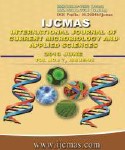


 National Academy of Agricultural Sciences (NAAS)
National Academy of Agricultural Sciences (NAAS)

|
PRINT ISSN : 2319-7692
Online ISSN : 2319-7706 Issues : 12 per year Publisher : Excellent Publishers Email : editorijcmas@gmail.com / submit@ijcmas.com Editor-in-chief: Dr.M.Prakash Index Copernicus ICV 2018: 95.39 NAAS RATING 2020: 5.38 |
Among the crops that feed human beings, Wheat (Triticum aestivum L.) is the second most important cool season crop in India. A drastic reduction in wheat production was observed due to increasing temperature. It has been estimated that global mean temperature is rising at 0.3% per decade which may cause 50% decline in wheat yields in South Asia by 2050. High temperature above than optimum has drastic effect on chlorophyll content which is also reflected by normalized difference vegetative index (NDVI). This experiment was conducted in an experimental field of the Wheat and Barley section, department of Genetics and Plant Breeding, CCSHAU, Hisar, during November to April 2015-16 and 2016-17 In this study, we evaluated chlorophyll content using SPAD and NDVI with the Green Seeker™ Handheld Optical Sensor Unit on recombinant inbred lines (RILs) of bread wheat derived from WH1021 (heat tolerant) and WH711 (heat sensitive) wheat genotypes. RILs were assessed for these spectral indices under two sowing dates i.e. normal and late sown during 2015-16 and 2016-17. Measurements were made at anthesis and 10 days after anthesis. Heat stress has significant negative effect on the leaf chlorophyll content. Average chlorophyll content and NDVI decreases as the temperature increase. A contrasting difference was observed in timely sown and late sown at 10 days after anthesis for both spectral indices. The result of this study may prove useful in the selection of physiologically efficient heat tolerant genotypes.
 |
 |
 |
 |
 |